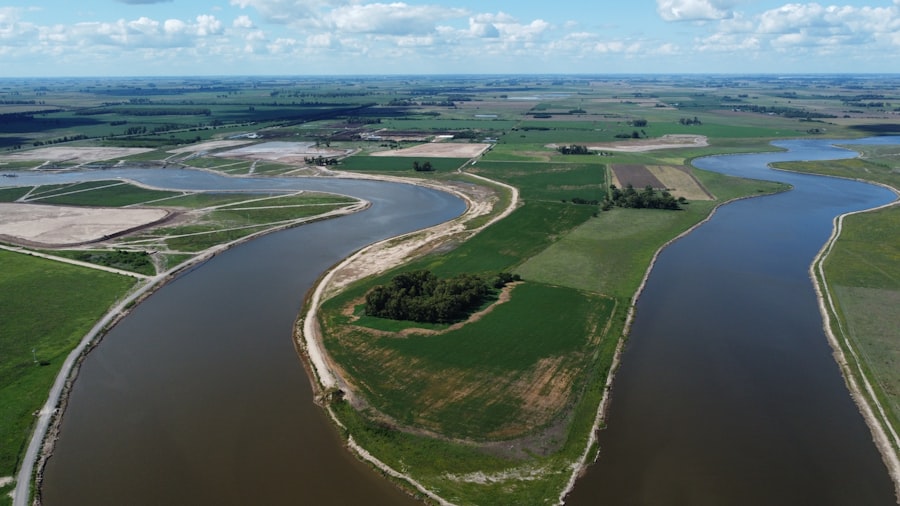The Mississippi River, one of the most iconic waterways in the United States, stretches over 2,300 miles from its source at Lake Itasca in Minnesota to its mouth at the Gulf of Mexico. This mighty river serves not only as a geographical landmark but also as a vital artery for commerce, culture, and history. Its vast basin encompasses numerous states, making it a central feature of the American landscape.
The river’s significance extends beyond its physical presence; it has played a crucial role in shaping the nation’s development, influencing trade routes, and serving as a natural boundary. The Mississippi River is often referred to as the lifeblood of America, reflecting its importance in various aspects of life, including agriculture, transportation, and military strategy. The river’s expansive network of tributaries and its ability to connect diverse regions have made it an essential resource throughout history.
As a result, the Mississippi has not only facilitated economic growth but has also been a focal point in military conflicts, serving as both a strategic asset and a formidable barrier.
Key Takeaways
- The Mississippi River is the second-longest river in North America, flowing through 10 U.S. states and serving as a vital transportation route.
- The Mississippi River has played a crucial role in military strategy throughout history, serving as a key strategic asset in various conflicts.
- During the Civil War, control of the Mississippi River was a major objective for both the Union and the Confederacy, leading to significant battles and campaigns.
- The Mississippi River’s natural barriers, such as its width and strong currents, have posed challenges for military forces attempting to cross it.
- The Mississippi River has had a significant impact on military operations, influencing tactics, supply routes, and navigation strategies.
Historical significance of the Mississippi River in military strategy
Throughout American history, the Mississippi River has been recognized for its strategic military importance. Its vast expanse and navigable waters have made it an ideal route for troop movements and supply lines. Control of the river has often determined the outcome of conflicts, as it provides access to key territories and resources.
The river’s role in military strategy can be traced back to early colonial times when it served as a critical route for exploration and settlement. During various conflicts, including the War of 1812 and the Mexican-American War, military leaders understood that controlling the Mississippi River was essential for maintaining dominance over the region. The river’s ability to facilitate rapid movement of troops and supplies made it a coveted asset for both offensive and defensive operations.
As such, it became a focal point in military planning, with commanders devising strategies that leveraged its geographical advantages.
The role of the Mississippi River in the Civil War

The Civil War marked a pivotal moment in the history of the Mississippi River, as it became a central battleground for both Union and Confederate forces. The river served as a critical supply line for the Union Army, enabling them to transport troops and resources efficiently. The Union’s successful campaign to gain control of the Mississippi was seen as a turning point in the war, as it effectively split the Confederacy in two and disrupted their supply chains.
One of the most significant military operations involving the Mississippi River was the Siege of Vicksburg in 1863. This strategic stronghold on the river was vital for Confederate control over the region. The Union’s victory at Vicksburg not only secured their dominance over the river but also provided them with a crucial logistical advantage.
The fall of Vicksburg marked a significant shift in the war, demonstrating how control of the Mississippi could influence broader military outcomes.
The Mississippi River as a natural barrier
| Aspect | Details |
|---|---|
| Length | 2,340 miles |
| Width | 20 miles at its widest point |
| Depth | 200 feet at its deepest point |
| Flow Rate | 7,000 to 20,000 cubic feet per second |
| Ecological Importance | Supports diverse wildlife and ecosystems |
Beyond its role as a transportation route, the Mississippi River has also functioned as a natural barrier throughout history. Its wide expanse and swift currents present formidable challenges for any military force attempting to cross it. This natural obstacle has often dictated military strategies, forcing commanders to consider alternative routes or methods for crossing.
The river’s status as a barrier was particularly evident during the Civil War when both Union and Confederate forces had to navigate its challenges. The difficulty of crossing the Mississippi often delayed troop movements and complicated logistics. As a result, military leaders had to devise innovative strategies to overcome this natural impediment, highlighting the river’s dual role as both an asset and an obstacle in warfare.
The challenges of crossing the Mississippi River
Crossing the Mississippi River has historically posed significant challenges for military operations. The river’s width, depth, and unpredictable currents can make navigation treacherous, especially during periods of heavy rainfall or flooding. These natural conditions can hinder troop movements and complicate supply logistics, forcing commanders to adapt their strategies accordingly.
In addition to environmental challenges, crossing the river often required extensive planning and resources. Military leaders had to consider factors such as available transportation methods, timing, and potential enemy interference. The construction of bridges or the use of ferries became essential components of military strategy when attempting to move forces across this formidable barrier.
These logistical challenges underscored the importance of thorough reconnaissance and planning in order to ensure successful crossings.
The impact of the Mississippi River on military operations

The impact of the Mississippi River on military operations cannot be overstated. Its presence has shaped not only tactical decisions but also broader strategic objectives throughout American history. Control over the river has often been synonymous with control over key territories and resources, making it a focal point in military campaigns.
For instance, during World War II, the Mississippi River continued to play a vital role in military logistics. Its navigable waters allowed for efficient transportation of troops and supplies to various fronts. The river’s significance as a supply route ensured that military operations could be sustained over extended periods, highlighting its enduring importance in modern warfare.
Strategies for navigating the Mississippi River
Navigating the Mississippi River requires careful planning and execution, particularly in a military context. Commanders have historically employed various strategies to ensure successful crossings and maintain control over this critical waterway. One common approach has been to establish secure supply lines along the riverbanks, allowing for efficient movement of troops and resources.
Additionally, military leaders have often utilized reconnaissance missions to gather intelligence about enemy positions and potential crossing points. Understanding the river’s currents and seasonal variations is crucial for planning successful operations. By leveraging local knowledge and employing skilled navigators, commanders have been able to devise effective strategies for crossing and securing the Mississippi River.
The Mississippi River as a supply route
The Mississippi River has long served as a vital supply route for military operations. Its navigable waters allow for the transportation of large quantities of goods, equipment, and personnel, making it an essential component of logistical planning. Throughout history, armies have relied on the river to sustain their operations and maintain their fighting capabilities.
During major conflicts such as the Civil War and World War II, control over the Mississippi was critical for ensuring that troops received necessary supplies. The ability to transport food, ammunition, and medical supplies via the river significantly impacted military effectiveness on both sides of various conflicts.
The influence of the Mississippi River on military tactics
The influence of the Mississippi River on military tactics is evident in numerous historical campaigns. Commanders have had to adapt their strategies based on the river’s geographical features and its role in shaping battlefield dynamics. For instance, during the Civil War, Union generals recognized that controlling key points along the river would disrupt Confederate supply lines and communication networks.
Moreover, tactics such as flanking maneuvers or amphibious assaults were often employed to exploit weaknesses in enemy defenses along the riverbanks. The unique characteristics of the Mississippi necessitated innovative approaches to warfare that took advantage of its natural features while mitigating its challenges. This adaptability has been crucial for military success throughout history.
Modern-day significance of the Mississippi River in military defense
In contemporary times, the significance of the Mississippi River extends beyond historical conflicts; it remains an important element in national defense strategies. The river serves as both a physical barrier against potential threats and a logistical asset for military operations. Its vast network continues to facilitate transportation and supply routes for modern armed forces.
Additionally, advancements in technology have enhanced navigation capabilities along the river, allowing for more efficient movement of troops and resources. Military planners recognize that maintaining control over this critical waterway is essential for ensuring national security and responding effectively to emerging threats.
The enduring importance of the Mississippi River as a formidable military barrier
The Mississippi River stands as a testament to its enduring importance in American military history. Its vast expanse has shaped strategies, influenced tactics, and determined outcomes in numerous conflicts throughout time. As both an asset and an obstacle, it has challenged commanders while providing opportunities for innovative approaches to warfare.
In modern times, the river continues to play a vital role in national defense strategies, serving as a critical supply route and natural barrier against potential threats. The legacy of the Mississippi River as a formidable military barrier endures, reminding us of its profound impact on shaping not only military operations but also the very fabric of American history itself.
The Mississippi River has long been recognized as a formidable natural barrier, playing a crucial role in military strategy throughout history. Its vast expanse and challenging currents have made it a significant obstacle for armies attempting to cross or control its waters. An interesting article that delves into the historical significance of the Mississippi River as a military barrier can be found on MyGeoQuest. This article explores various military campaigns and strategies that have been influenced by the river’s geography. For more detailed insights, you can read the full article by visiting mygeoquest.
com/sample-page/’>this link.
WATCH THIS! The Hidden Reason No One Can Invade America | A Geographical Analysis
FAQs
What is the Mississippi River?
The Mississippi River is the second-longest river in North America, flowing from northern Minnesota to the Gulf of Mexico.
How has the Mississippi River been used as a military barrier?
The Mississippi River has historically served as a natural barrier, making it difficult for military forces to cross and control territory on the opposite side.
What military conflicts have involved the Mississippi River as a barrier?
The Mississippi River played a significant role in the American Civil War, where control of the river was crucial for both the Union and Confederate forces.
How has technology impacted the military significance of the Mississippi River?
Advancements in transportation and military technology have reduced the natural barrier effect of the Mississippi River, making it easier for military forces to cross and control territory.
What are the current military implications of the Mississippi River?
While the Mississippi River is no longer the formidable barrier it once was, it still holds strategic importance for military operations and logistics in the United States.
